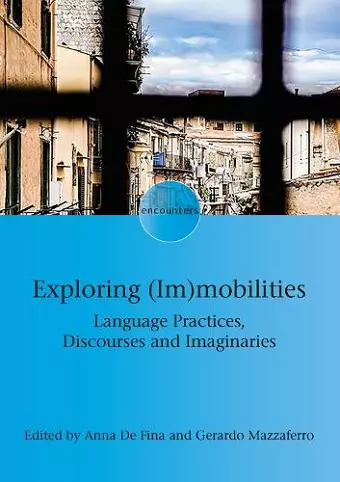Exploring (Im)mobilities
Language Practices, Discourses and Imaginaries
Anna De Fina editor Gerardo Mazzaferro editor
Format:Hardback
Publisher:Multilingual Matters
Published:23rd Nov '21
Should be back in stock very soon
This hardback is available in another edition too:
- Paperback£37.95(9781788925280)

Timely addition to research on mobility and immobility and how it manifests in language use
The chapters in this volume use ethnographically-based methodologies to address the interconnectedness between forms of mobility and immobility in international migratory processes or in discriminatory practices within the boundaries of national states, thus bringing to light a sociolinguistics responsive to 21st century concerns.
The impact of mobility and superdiversity in recent sociolinguistic research is well-established, yet very few studies deal with issues related to immobility. The chapters in this book focus on the sociolinguistic investigation of the dynamics between mobility and immobility as experienced by migrants, asylum seekers and members of minority or exploited groups. Central to the book is an exploration of how mobilities are affected by and in turn affect power relations and of the kinds of resources used by people to deal with (im)mobility processes. The book brings to light a new critical sociolinguistic imagination that is responsive to 21st century processes of (im)mobilities as socially, discursively and emotionally constructed and negotiated.
This is an extremely timely book that reminds us of some of the neglected aspects of the new mobility paradigm in sociolinguistic research. It covers research contexts that have not been previously explored. Its conceptual and methodological innovations ensure the book’s lasting impact on theory, research design, policy and practice. * Li Wei, University College London, UK *
This book treats the notion of (im)mobilization in a competent and nuanced manner. It considers at least four competing but complementary perspectives: (1) language resources and repertoires, (2) language practices and technologies, (3) control, mobility and resistance, and (4) subjectivity, identity and agency, drawing from examples in different regions of the globe. This is a welcome and timely addition to the expanding scholarship on the topic. * Sinfree Makoni, Pennsylvania State University, USA and Laikipia University, Kenya *
Among the large animals, humans stand out for their propensity to migrate, their social stratification, and their complex symbolic communication. The authors of this volume explore the intersection of mobilities, inequalities, and discourses in a powerful set of contemporary case studies from around the world. * Ingrid Piller, Macquarie University, Australia *
Exploring (Im)mobilities is certainly an interesting read for those who want to know more about the role of language in contexts of (im)mobilization and processes of (im)mobility. It is written in a style that is accessible to undergraduate and more senior scholars as well as to the informed reader with an interest in language-on-the-move.
-- Noel B. Salazar, KU Leuven, Belgium * Journal of Sociolinguistics, 2022 *Speaking from my own collaboration (Holsapple 2022) with Multilingual Matters, I can affirm that Exploring (Im)mobilities: Language Practices, Discourses and Imaginaries is no exception to their commitment to publishing critically-engaged scholarship that hinges on challenging and shaking up, rather than assuming and reifying normative patterns of analysis. Addressing the widespread fallacy of considering mobility primarily through a positivist lens, the volume's eleven sociolinguistic case studies bring to the forefront agentive meaning-making practices through which (im)mobility is reconfigured, as experienced by asylum-seekers, migrants, and other minoritized mobile groups.
* Christiana Decheva, University of Tartu, Estonia, Tertium Linguistic Journal 8 (1) (2023) *ISBN: 9781788925297
Dimensions: 210mm x 148mm x 19mm
Weight: 514g
296 pages